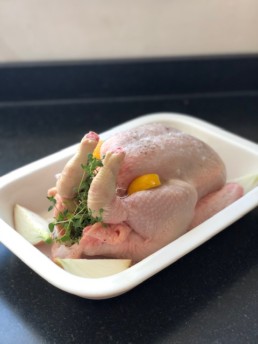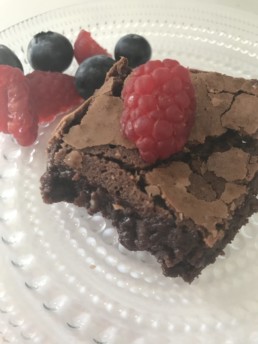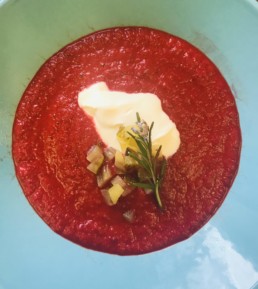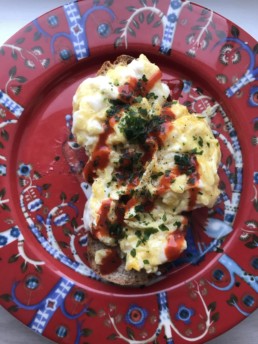What’s for Supper – a plant based Indian supper
Here come a delicious selection of recipes from the much loved and much respected Jackie Hobbs. Jackie, like the rest of the team, trained at Leiths and had a previous life as a biology teacher. A science background is very often the launch pad for a career in food. One of our team has a previous career as a nurse, another worked for a well know plant research company. I started the business as a result of inspiration acquired while working as a finder of emerging trends in global consumer behaviour for large food brands. We all share a solid, classic training acquired at Leiths and/or Le Cordon Bleu.
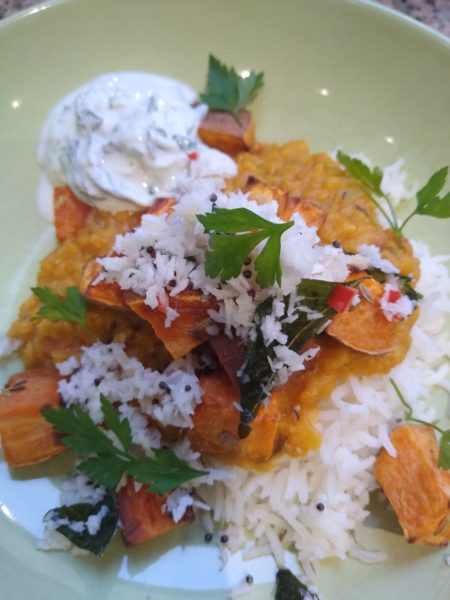
When I emailed Jackie to ask what she was cooking, she replied with these mouth watering, plant based Indian supper of Basmati rice, red lentil Dahl, roasted sweet potato, coconut relish and a cucumber and mint Raita.
Dhal
The term Dhal is used on the Indian sub continent to describe dried, split pulses, ie peas, lentils and beans. These pulses constitute a cheap and excellent source of protein in areas where religion stipulates a vegetarian diet.
The word garam refers to “heating the body” in the Ayurvedic sense of the word, as these spices are believed to elevate body temperature in Ayurvedic medicine.
Pulses
300g red lentils, washed
1 litre of water
1 tsp of salt
1 tin of chopped tomatoes
1 ½ tsp turmeric
Squeeze of lemon juice, fresh chopped coriander
Tarka
2 tablespoon vegetable oil
1 tablespoon butter
1 tsp cumin seeds
1 onion chopped
5 cloves garlic
2 tsp ground coriander
1tsp garam masala
salt
1.Place lentils in a pan with the salt, tinned tomatoes and turmeric. Cover with water
bring to the boil
Remove the froth, reduce the heat and put the lid on the pan – leave to
simmer for 10 minutes. Check the lentils are cooked by squeezing them
between your fingers. Once soft remove from the heat.
2.In a frying pan, heat the oil and butter and add the cumin seeds and cook for 30 sec
onds.Add the onion and garlic to the spice, fry until lightly browned. Reduce the heat
and add the ground coriander and salt.
3.Gently let the ingredients cook for 10 minutes to make a thick masala paste.
Add a ladle full of the lentils (dhal) to the masala paste in the frying pan and stir
together then empty all the contents back into the pan with the lentils
and stir. It should have the consistency of a thick soup but if it’s too thick
just add a little boiling water and remove from the heat. If you prefer it
thicker just leave it on the heat to reduce until you get the consistency you
want.
4.Check the seasoning and add a salt- it tends to be required. Stir in the garam
masala powder, a squeeze of lemon juice and fresh chopped coriander.
The sweet potatoes are simply washed, cut into cubes, tossed in oil and roasted, with cumin and fennel seeds, for 30minutes at 200C.
Coconut relish is another super simple, yet utterly delicious little dish made from desiccated coconut which is left to soak in hot water for a few minutes and mixed with mustard seeds and curry leaves, which have been fried in oil together with some red chilli and fresh ginger. This lovely combination is rounded off with a yoghurt Raita made, as always, with full fat natural yoghurt and fresh mint leaves and grated cucumber.
What’s for Supper – Easy Easter lunch
April 11, 2020
What’s for Supper – Borscht
April 6, 2020
